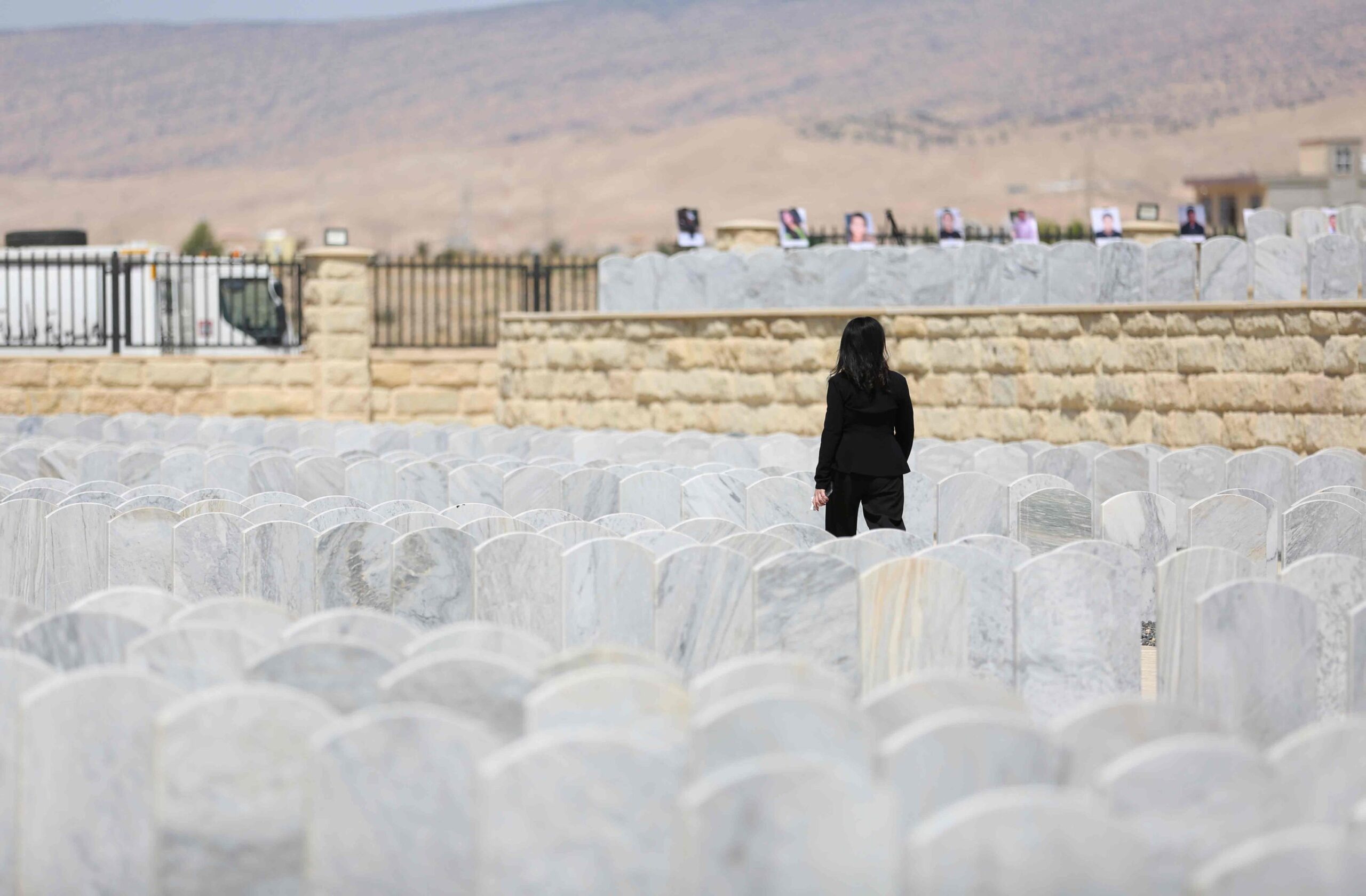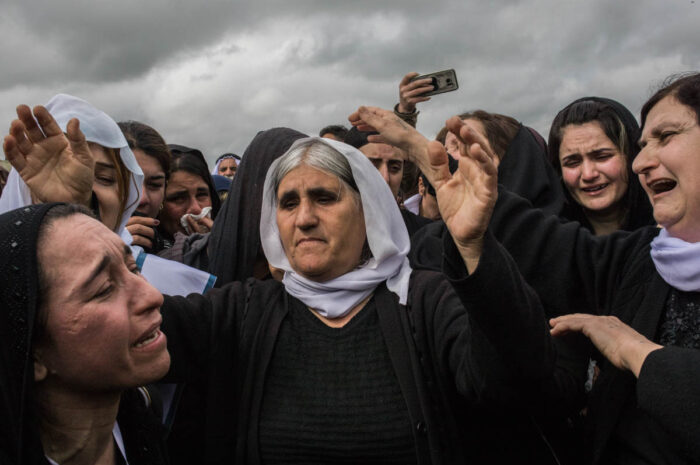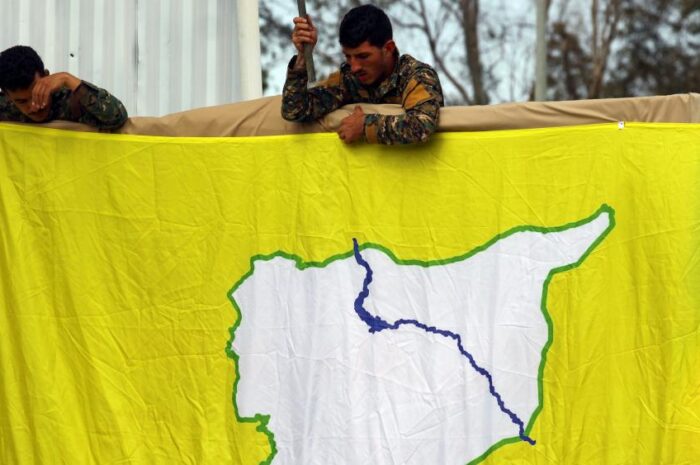
Note: The following article was originally published in the Jerusalem Post.
Ten years have passed since the Islamic State of Iraq and Syria (ISIS, or Daesh) began its campaign to systematically annihilate the 400,000-strong Yazidi community. This rampage targeted mostly defenseless civilians in northern Iraq, resulting in the displacement of hundreds of thousands and the kidnapping and mass-murder of thousands more—culminating in the mass-enslavement of those spared from massacre.
Despite these atrocities, the Yazidi community remains fractured and continues to fight for justice and reconciliation. A decade later, survivors still suffer from mental health issues, impoverished conditions, destroyed homes, and displacement in a region now mired in sectarian strife. This ongoing crisis demands immediate attention, including humanitarian aid, legal and mental support for survivors, and a resolution to Sinjar’s security concerns.
The Yazidis need active support to prevent their erasure.

Who are the Yazidis?
The Yazidis are an indigenous ethno-religious group that live in Iraq and Syria’s Kurdistan regions, with the largest concentration in the Sinjar region of northern Iraq. Members of the community practice Yazidism, a monotheistic religion that predates Islam.
Lalish in Kurdistan is their ancestral spiritual heartland, where Yazidis make pilgrimage to pay respects to the tomb of Sheikh Adi ibn Musafir–the holy incarnation of the peacock angel, Tawusi Melek. The spiritual leader of the Yazidis is the Baba Sheikh (currently Sheikh Ali Ilyas) who provides guidance to the community.
Yazidis are a minority in the region, facing religious discrimination for their faith by the dominant Islamic population. Religious clerics hostile to the Yazidis pejoratively labeled the faith, “devil worship” and issued “fatwas” (religious decrees) calling for their persecution. This persecution took the form of massacres, ethnic cleansing, and forced conversions, creating a culture of isolation as Yazidis were forced to hold onto their identity tightly, at all costs.
Before the Islamic State began its genocide in 2014, the Yazidis endured 73 “firmans”–fatwas that led to violence and destruction. From the Ottoman era to Saddam Hussein, each firman has been a tragedy for the people and the invasion by ISIS in 2014 marked a new chapter of suffering for the Yazidis.

The 74th Firman: Daesh’s Genocidal Campaign
In August 2014, Daesh began its genocidal campaign with the invasion of northern Iraq. This invasion initiated the 74th firman against the Yazidi people leading to the murder of 3,100 Yazidis, the abduction of over 6,000 women and girls, and the displacement of 400,000.
Sinjar’s geographical location made it a focal point for the Islamic State’s ideological project. Abu Bakr al-Baghdadi, along with other members of Daesh leadership, viewed the Yazidi homeland as “infidel” territory ripe for conquest and exploitation. Baghdadi aimed to create a Salafi-jihadist proto-state built around strict adherence to “Sharia Law,” which enforced gender apartheid, subjugated Indigenous peoples, and eliminated infidels.
Kurdish Peshmerga were unable to fend off the invasion and security quickly dissipated as their fighters fled quickly when militants invaded, leaving Yazidis vulnerable to attack. Villages like Kocho in the surrounding area of Sinjar City witnessed massacres by Daesh fighters, who murdered boys, men, and the elderly near public places such as schools. Militants also abducted women and girls, subjecting thousands to sexual slavery.
Tens of thousands more fled to the mountains of Sinjar to escape from these depraved crimes against humanity.
The Islamic State’s Fatwa Issuing Department (Diwan al-Buhuth wa al-Iftaa) justified this carnage through fatwas such as no. 11, which declared Yazidis “disbelievers.” Propaganda pamphlets reinforced edicts and brought back archaic practices like slavery (“From Creator’s Rulings on Capturing Prisoners and Enslavement”).
An important part of Daesh’ governance structure involved sexual violence, manifested in the slave network the organization operated. The architect for this illegal market, Hajji Abdullah (Abdul Nasser Qardash), created this network and contributed Yazidi women and girls to human trafficking networks across the MENA region. Messaging apps like WhatsApp facilitated the selling of sexual slaves, with girls as young as 12 highly sought by the leadership.
According to Susan Hutchinson of the Lowy Institute (“The Yazidis still wait for Justice,” 2024), the Islamic State potentially profited around $111 million from sexual slavery. The worst acts perpetrated by the group involve rape, exposure to the elements, and other sexual violence. These acts are documented in UN reports such as “They came to Destroy”: ISIS crimes Against the Yazidis” (A/HRC/32/CRP.2) from 2016.
Frontiers report on “The psychological impact of genocide on the Yazidis” in 2019 by Jan Ilhan Kizilhan and co. noted the following impact on Yazidis:
“It has been shown that formerly enslaved Yazidi females suffer from higher prevalence of mental stress (97.1%), PTSD (90.6%), suicidal ideation (38.1%), depression (36.7%), and general anxiety symptoms (37.4%) (Taha and Slewa-Younan, 2020). Among those who had been sexually abused, very high prevalence rates of mental stress of 50.9% for complex PTSD and 20% for PTSD were found (Hoffman et al., 2018).”

International Response and the quest for justice
The United States spearheaded a global coalition of over ten nations to respond to the emerging humanitarian crisis. CENTCOM’s Operation Inherent Resolve started in earnest by aiding Yazidis trapped on Mount Sinjar. Syrian Kurdish forces from neighboring Rojava (northeast Syria) helped to open a humanitarian corridor, rescuing thousands. Fighters from the Kurdistan Workers’ Party (PKK), US military personnel and Peshmerga then pursued Daesh militants, pushing them back out of Sinjar in the subsequent years.
The five-year campaign to liberate the people from the Islamic State’s occupation contributed to the destruction of the proto-state. Rescue operations conducted by US special forces in coordination with local partner forces has freed many Yazidis held captive by Daesh. The stories from these survivors, such as the one told by Nadia Murad have gone on to demonstrate the atrocities perpetrated by Daesh and the need for justice. A legal mechanism that can put Daesh perpetrators on trial with the evidence gathered from personal anecdotes, forensic data and resources provided by investigators is imperative to justice.
However, many Yazidis remain missing with families spending considerable resources to track victims caught in the shadow of genocide. Sinjar’s infrastructure remains decimated with the Iraqi government notoriously providing little funding to the Nineveh Governorate. This includes a lack of funding assistance to survivors who reside in displacement camps in poor conditions that are antithetical to their recovery. Restoring funding to this region through international mechanisms such as the International Monetary Fund is important to rebuild homes.

The Iraqi parliament also put forward two controversial pieces of legislation that make the process of justice for victims more difficult. The Personal Status Law and General Amnesty Law, the former making child marriage legal in the country and the latter providing amnesty for ISIS fighters held in captivity. Along with these laws, the government’s request for the shutdown of the United Nations Investigative Team to Promote Accountability for Crimes Committed by Daesh/ISIL raises concerns of accountability. Condemning such legislation and pressuring the government of Iraq is needed now more than ever.
Sinjar’s security situation adds an additional complex layer to the future protection of the Yazidi homeland. Disputes between Iraqi government forces, Iranian backed Hashd al-Shaabi, PKK affiliate militants and the Kurdistan Regional government’s (KRG) peshmerga have led to conflicts. A security agreement in 2020 aimed at settling disputes is yet to be fully implemented.
President of the KRG, Nechirvan Barzani reiterated support for the Sinjar agreement during a speech commemorating the anniversary of the genocide. This agreement signed between the KRG and Iraqi government would inject funds into the region, create a joint security mechanism and settle administrative issues. Support for the implementation of this agreement is needed to establish normality and stability in the Sinjar region.

The future of the Yazidi community remains in a precarious situation. International efforts must continue to address the many challenges that the Yazidis face to prevent their erasure and from tragedy befalling them again.
Written by Anthony Avice Du Buisson (08/14/2024)

![A geopolitical primer on the Afrin Crisis – The Region [Article]](https://philosophyismagic.com/wp-content/uploads/2020/07/C-1IbUZWsAAkIl_-700x465.jpg)


